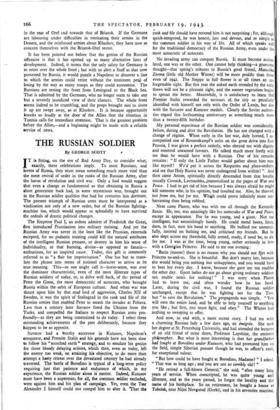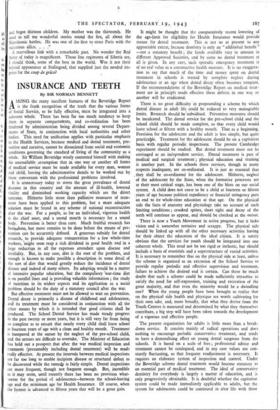THE RUSSIAN SOLDIER
By GEORGE SCOTT The Emperor Paul I, an ardent admirer of Frederick the Great, first introduced Prussianism into military training. And yet the Russian Army was never in the least like the Prussian, externals excepted, for no pedantic training could kill the natural attributes of the intelligent Russian peasant, or destroy in him his sense of individuality, or that burning, divine—as opposed to fanatic— enthusiasm, for an inspired cause. Today, this gift is commonly referred to as " a flair for improvisation." One has but to trans- late the phrase into terms of national character to arrive at its true meaning. This—as one might call it—horse-sense, was ever the dominant characteristic, even of the most illiterate types of Russian soldiery of today, or, to delve well back, of the period of Peter the Great, the most democratic of autocrats, who brought Russia within the orbit of European culture. And when war was thrust upon him by that mad lord of aggression, Charles XII of Sweden, it was the spirit of Stalingrad in the rank and file of the Russian armies that enabled Peter to smash the invader at Poltava. Less than a century later Suvarov freed the Ukraine from the Turks, and compelled the Italians to respect Russian arms pro- foundly—as they are being constrained to do today. I select these outstanding achievements of the past deliberately, because they happen to be so apposite.
Suvarov had a worthy successor in Kutusov, Napoleon's conqueror, and Premier Stalin and his generals have not been slow to follow his "scorched earth" strategy, and to emulate his genius for those bloody delaying actions, which then, even as today, left the enemy too weak, on attaining his objective, to do more than attempt a hasty retreat over the devastated country he had already traversed. The battle of Borodino is typical of a long-term policy requiring just that patience and endurance of which, in my experience, the Russian soldier alone is master. Indeed, Kutusov must have been a superman; for all, the common soldier excluded, were against him and his plan of campaign. Yet, even the Tsar Alexander I himself could not compel him to alter it. "That the rank and file should have revered him is not surprising ; for, although quick-tempered, he was honest, just and devout, and as simple as the common soldier in his way of life. All of which speaks well for the traditional democracy of the Russian Army, even under the .most autocratic of autocrats.
No invading army can conquer Russia. It must become assimi- lated, one way or the other. One cannot help thinking—a gruesome thought—that spring's tributes to Russia's good friend, Matushita Zeema (little old Mother Winter) will be more prolific than those even of 1942. The Steppe in full flower is at all times an un- forgettable sight. But this year the naked earth revealed by the early thaws will not be a pleasant sight, and the sooner vegetation begins to sprout the better. Meanwhile, it is satisfactory to learn that Premier Stalin rewarded the saviours of. the city so peculiarly identified with himself not only with the Order of Lenin, but also with the Suvarov and Kutusov medals. Clearly the Soviet authori- ties regard this forthcoming anniversary as something much more than a twenty-fifth birthday.
My personal experience of the Russian soldier was considerable, before, during and after the Revolution. He has not changed with a change of regime. When early in the last war, duly horsed, I ac- companied one of Rennenkampf's units on the great drive into East Prussia, I was given a perfect orderly, who obeyed me with dignity and resented unearned favours. He talked much more freely with me than he would have with a Russian. One of his remarks remains: " If only the Little Father would gather about him men like myself ! We'd put it across the Rasputins and place-seekers, and see that Holy Russia was never endangered from within! " And then came Anton, spiritually directly descended from that lovable rascally Cossack, Lavroushka,.irnmortalised in the pages of War and Peace. I had to get rid of him because I was always afraid he might kill someone who, in his opinion, had insulted me. Also, he thieved, not from me, but for me. Wh.h could prove infinitely more em- barrassing than being robbed.
Next came Platon, who was with me all through the Kerensky fiasco. He, too, was amazingly like his namesake of War and Peace, except in appearance. For he was young, and a giant., Not too intelligent, but astonishingly handy. He could mend boots, linen, darn, in fact, turn his hand to anything. He bullied me unmerci- fully, insisted on bathing me, and criticised my friends. But he also slept across my threshold, fully armed, ready, if need be, to die for me. I was at the time, being young, rather seriously in love with a Georgian Princess. He said to me one evening:
"Barin (master) there is no reason why you should not flirt with Princess so-and-so. She is beautiful. But don't marry her, because she would bring you nothing but unhappiness, and you would have to beat her every day. I know, because she gave me ten roubles the other day. Great ladies do not go about giving ordinary soldiers ten rouble notes for nothing! " I was sorry when Platon had to leave me, and often wonder how he has fared. Later, during the civil war, I found the Russian soldier unchanged, except that he was fighting not for the Tsar, but " to save the Revolution." The propaganda was simple. " You will own the entire land, and be able to help yourself to anything you like ; but first, you must fight, and obey." The Whites had nothing so sweeping to offer.
And now, to end with, a more recent story. I had tea with a charming Russian lady a few days ago, an imigree. She took her degree at St. Petersburg University, and had attended the lectures of an old friend of mine there, Professor Lapshine, the eminent phi(Osopher. But what is most interesting is that her grandfather had fought at Borodino under Kutusov, who had promoted him on the field, simple Siberian peasant though he was, to officer's rank, for exceptional valour.
" But how could he have fought at Borodino, Madame? " I asked. " That was so long ago; and you are not so terribly old! "
"He retired a full-blown General," she said, "after many long years of service. When conscripted, he was quite young and illiterate, and as the years passed, he forgot the locality and the name of his birthplace. So on retirement, he bought a house at Tobolsk, near Nijni Novgorod (Gorki), and in his seventies married. and begot thirteen children. My mother was the thirteenth. He used to tell me wonderful stories round the fire, all about the Napoleonic battles. He was one of the first to enter Paris with the victorious allies. . .
A marvellous link with a remarkable past. No wonder the Red Army of today is magnificent. Those line regiments of Siberia are, I should think, some of the best in the world. Was it not their belated appearance at Stalingrad, that supplied just the needed im- petus for the coup de grace?



























 Previous page
Previous page